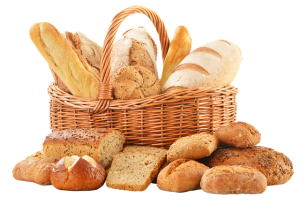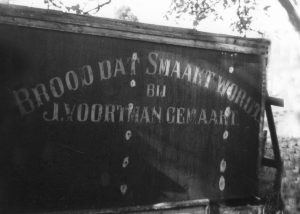
“I have found such joy in simple things;
A plain, clean room, a nut-brown loaf of bread
A cup of milk, a kettle as it sings,
The shelter of a roof above my head . . .”
One of the silver linings of this time of isolation is that we have a chance to find out how wonderful the simple blessings of life can be, and truly how much we already possess in our lives.
Many people are taking the gift of extra time to enjoy baking. When my daughters make their own bread, it seems a serendipitous revival of their heritage. Their great-grandfather owned a bakery in a small town in Holland, and he delivered his bread to customers using a horse and wagon. Tasty bread, if his slogan is translated correctly!
Once, years ago, when my Dad was observing as I plaited my small daughter’s hair, he commented that he knew how to do that. When I looked at him skeptically, he assured me that indeed he had braided the dough for many loaves of bread! A bakery meant hard work, requiring the participation of the whole family, and it sustained them as they were growing up.

Recently, I heard a fascinating TED talk by Peter Reinhart, master breadmaker, teacher, author, and theologian. He has written books, including The Bread Baker’s Apprentice, and calls bread a “transformational food.” All over the world, people are nourished by various forms of bread. Bread is “the staff of life.”
Reinhart points out that breadmaking is a process of death and resurrection, beginning with the death of the wheat when we harvest and crush its seeds to make flour. Creator-like, we form a kind of clay, adding water. Leaven is introduced as a new life, which in turns gives up its life in the baking.
To interpret his own craft, Reinhart turns to the ancient teaching that there are different levels in a story: the literal, the metaphorical, the ethical, and the mystical or poetical. And we see that bread can be symbolic of much more.
Jesus offers himself as the “Bread of Life.” All things exist because of Him, because of His sacrifice. We truly live in this literal and mystical nourishment. What appears simple, everyday, and ordinary is so much more.
We celebrate the sacrament of communion with the breaking of bread, but in a sense, all bread is sacred. It is a gift from a providential God.
” . . . Oh, I have found such joys I wish I might
Tell every woman who goes seeking far
For some elusive, feverish delight,
That very close to home the great joys are:
The elemental things – old as the race,
Yet never, through the ages, commonplace.”
Selections from Grace Noll Crowell, “I Have Found Such Joy”